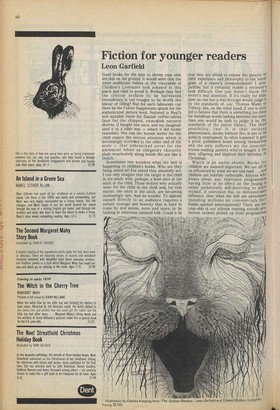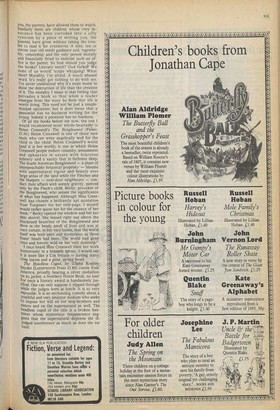Fiction for younger readers
Leon Garfield
Good books for the nine to eleven year olds are thin on the ground. It would seem that the more ambitious toilers in the vineyards of Children's Literature look askance at this patch and tend to avoid it. Perhaps they feel the critical acclaim to be harvested thereabouts is too meagre to be worth the labour of tilling? Not for such labourers can there be the Colour Supplement splash for the sophisticated picture book, featured in Heal's and suitable more for Danish coffee-tables than for the chipped, unmodish nursery shelves. (I bought one once, and my daughter used it as a table mat — which it did rather resemble). Nor can the honest writer for the child expect the serious attention which is increasingly accorded to the other end of the scale — that unbreeched novel for the adolescent where an obligatory obscurity plods wearisomely along beside the tale like a crutch. •
Sometimes one wonders what the hell is happening to children's books. Who are they being aimed at? For aimed they assuredly are. I can only imagine that the target is the child in the adult, with, perhaps, a bosh shot at the adult in the child. Those writers who actually write for the child in the child and, for that matter, the adult in the adult, are becoming increasingly rare. And no wonder. To address oneself directly to an audience requires a certain courage and honesty that is hard to come by and seems, more and more, to be lacking in otherwise talented folk. Could it be
that they are afraid to expose the paucity of their experience and philosophy to the harsh glare of a reader's comprehension? I syUl pathise; but it certainly makes a reviewer s task difficult. One just doesn't know the writer's real intention. If it's really for kids, then no one but a real Scrooge would judge It by the standards of, say, Thomas Mann or Tolstoy; but, on the other hand, if one is slylY led to believe that there is something too deep for humdrum words lurking between the lines, then one would be rash to judge it by the standards of the junior library. The third possibility, that it is that striking phenomonon, smoke without fire, is not to be publicly entertained. So what happens? It gets a prize, publishers boast among themselves and the only sufferers are the innocent, review-reading parents who've bought it for their offspring and blighted their birthday Of Christmas.
Which is an awful shame. Books for children are damned important. We are all of us influenced by what we see and read ... and children are horribly vulnerable. Anyone wild bleats about, say, television programmes having little or no effect on the young IS either pathetically self-deceiving or plain wicked. If television Has no demonstrable influence, then what the hell are advertisers_ spending millions on commercials for? Public-spirited entertainment? There are ten year-olds in our schools running vicious protection rackets picked up from programtnes
you, the parents, Ikave allowed them to watch. Similarly there are children whose very innocence has been corroded into a silly Cynicism by a piece of writing you, the Parents, have given without taking the trouble to read it for yourselves. A nine, ten or eleven year old needs guidance and, regrettably, censorship; and the only person morally and financially fitted to exercise such an ofi4 lice is the parent. So how should you judge the books? Literary merit? God forbid! We none of us would 'scape whipping! What then? Morality, I'm afraid. A much abused word. It's really got nothing to do with sex. I've never understood why it's more moral to show the destruction of life than the creation of it. The morality I mean is that feeling that
Pervades a book so that when a reader 4 4 14 14 emerges from the story he feels that life is worth living. This need not be just a simple minded optimism; but it does mean that a Pessimist has no business writing for the Young. Indeed, a pessimist has no business.
Of all the books before me now, the one I would recommend most whole-heartedly is
Helen Cresswell's The Bongleweed (Faber, £1.50.) Helen Cresswell is one of those rare souls who can write angelically well for the Child in the child. Helen Cresswell's world (and it is her world), is one in which Helen Cresswell people endure calamity, amazement and upheavals in nature with hilarious sobriety and a sanity that is fathoms deep. The South American Bongleweed — a plant of unimpeachable botanical propriety — blooms With supernatural vigour and beauty over large areas of the land while the Finches and the Harpers — next-door neighbours — conduct their affairs with seemly gravity, pierced only by the Finch's child, Becky, provoker of the Bongleweed, who senses the significance of what has happened. Although Miss Cresswell has chosen a brilliantly apt quotation from Turgenev for her title-page, I myself would rather quote her for the essence of her book; "Becky opened the window and felt her Skirt shrivel. She leaned right out above the blackened branches of the Bongleweed and drew in the heady smell of frost and was at Once certain, in her very bones, that the world Itself was both alert and mysterious as those foxes' heads had been. The world had gone once and forever wild on her very doorstep."
I once heard Miss Cresswell liken her work humorously to a brussels sprout. I would say It is more like a Cos lettuce — having many Crisp leaves and a good, strong heart.
The Headless Cupid, by Zilpha Keatley Snyder (Lutterworth Press £1.60) comes from America, proudly bearing a silver medallion en its jacket: a Newbery Honor Book, no less! for once a literary award is handsomely justified. One can only suppose it slipped through While the judges were at lunch. It is so very enjoyable. It is an enchanting comedy about a Youthful and very amateur medium who seeks tO impose her will on her step-brothers and sisters and on the supernatural as well. The headless cupid of the title is a broken bannister whose mysterious reappearance suggests that the supernatural deplores the illJudged interference as much as does the natural.



































































 Previous page
Previous page